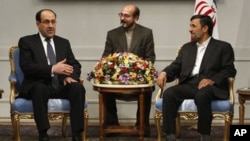The U.S. State Department on Monday expressed renewed concern about what it says is Iranian "meddling" in Iraqi politics as Iraqi Prime Minister Nouri al-Maliki visited Tehran. A State Department envoy, meanwhile, reaffirmed U.S. support for Lebanon's sovereignty, following a visit there by Iranian President Mahmoud Ahmadinejad.
The State Department says it understands the need for a democratic Iraq to have relations with Iran and that it is not criticizing Mr. Maliki's decision to visit Tehran.
But it is urging caution on the part of Iraqi leaders, saying that Iran can be a better neighbor by respecting Iraqi sovereignty and ending support for "those who use violence in Iraq."
The comments by State Department Spokesman P.J. Crowley followed meetings by the Iraqi prime minister with Iran's supreme religious leader Ayatollah Ali Khamenei and President Mahmoud Ahmadinejad.
Iranian state television says Mr. Maliki also met in Tehran with exiled Iraqi Shi'ite cleric and militia leader Moqtada al-Sadr - a strong opponent of the U.S. presence in Iraq, who is now supporting a second term in office for Mr. Maliki, a fellow Shi'ite.
Sadr fled to Iran in 2008, after Mr. Maliki ordered Iraqi troops, backed by U.S. forces, to move against Sadr's Mahdi Army militia amid sectarian warfare in Iraq.
U.S. officials say they do not believe Sadr has abandoned violence and they are concerned about his potential role in Iraqi politics and ties with Iran.
The State Department's P.J. Crowley said the United States is "worried" about any neighbor that would meddle in Iraq's troubled post-election coalition-building effort. "Ultimately, this has to be an Iraq decision, as part of its own political process. And we have every indication that Iraq's leaders are working to try to form a government. We just want to see that government be as inclusive as possible. Our concerns about Iran and its meddling in Iraq's affairs are long-standing. But that said, we would expect the Iraqi government to work on behalf of its own citizens and not on behalf of another country," he said.
Mr. Maliki, whose political party finished second in elections in March, is trying to form a national unity government to end the country's long political deadlock.
The United States says it supports an "inclusive" coalition that would include the four top-finishing parties, but in the process limit Moqtada al-Sadr's influence.
In another development, Assistant Secretary of State for Near Eastern Affairs Jeffrey Feltman met Lebanese President Michel Suleiman in Beirut on Monday, following last week's controversial Lebanon visit by Iranian President Ahmadinejad.
Ina written statement, Feltman said he delivered a message from President Barack Obama reaffirming "steadfast" U.S. support for the development of a "sovereign independent Lebanon with strong and effective state institutions."
The Ahmadinejad visit, which included a stop in the southern Lebanon stronghold of the Iranian-backed Hezbollah militia near the Israeli border, alarmed Lebanese and other Arab moderates and was condemned by Israel.
The Feltman statement says the United States is concerned by any act that would undermine Lebanese stability.
It also says President Obama "firmly supports" the work of the international tribunal investigating the 2005 assassination of former Lebanese Prime Minister Rafik Hariri.
The tribunal has recently come under heavy criticism by Hezbollah, amid news reports that members of the Shi'ite militia group and political party might be implicated in the killing.
US: Iran 'Meddling' in Iraq as Maliki Visits Tehran




